新编大学英语3unit 4 知识点
- 格式:ppt
- 大小:191.00 KB
- 文档页数:38
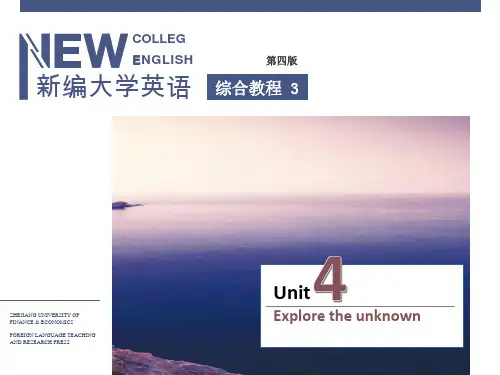
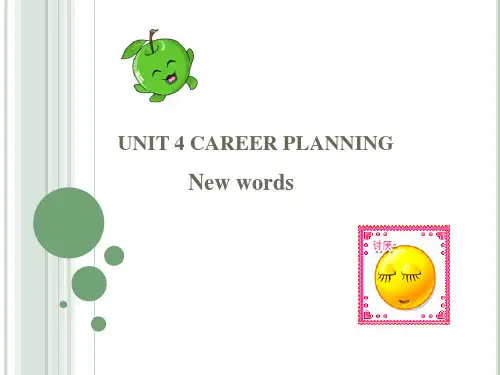
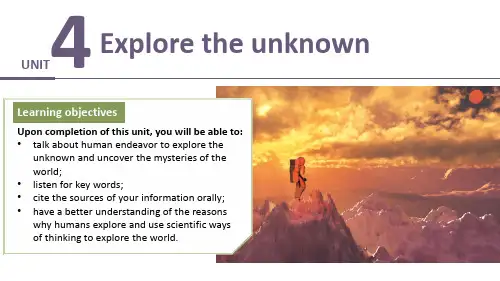
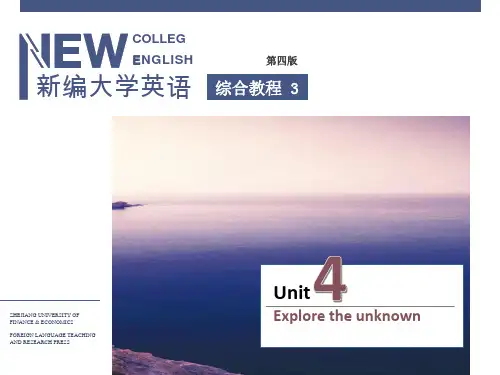

Unit 1. PersonalityPart One- Preparation1.Mr. And Miss So and So1) Gentle 2) Dedicated 3) Considerate 4) Adventurous 5) Calm 6)Aggressive 7) Critical 8) Energetic 9) Selfish 10) Ambitious 11) Self-confident 12) Easygoing 13) Truthful 14) Outgoing 15) Frank 16) Sensitive 17) Bossy 18)Patient 19) Talkative 20) Persuasive 21) Sympathetic 22) Emotional2. Personality and JobSalesperson- shrewed, hard-working, boastful, acute, trickyTeacher- patient, tolerant, talkative, unselfish, loving, humorous, bossyDoctor- patient, calm, independent, careful, sympatheticPolice officer- brave, alert, independent, strong, calmAccountant- careful, honest, cautious, patientLawyer- persuasive, expressive, eloquent, serious, knowledgeable, talkativeTourist guide- enthusiastic, talkative, expressive, energetic, considerate, good-temperedHost or hostess of a show- emotional, expressive, optimistic, quick-minded, exaggerated, humorousReporter- cautious, extroverted, open-minded, adventurousSecretrary- easygoing, tolerant, sensitive, frank, thorough, efficientSpokeperson- intelligent, talkative, diplomatic, cautious, matter-of-factPart Two – Post-readingReading Comprehension1.Understanding the Organization of the Text1)Introduction: (para1)Shyness is the cause of much unhappiness for a great many people2)Reasons why shyness can have a negative effect: (para2-3)People’ s self-concept has a profound effect on all areas of their lives.People with high self-esteem unsually act with confidence.People with low self-esteem are likey to be passive and easily influenced by others.3)Ways of overcoming shyness: (para 4-15)i)Recognize your personal strengths and weaknesses.ii)Set reasonable goals.iii)Don’t waste time and energy on destructive feelings such as guilt and shame.iv)Don’t be afraid to speak up and give your point of view.v)Do not make negative comments about yourself.vi)Accept criticism thoughfully.vii)Profit from failures and disappointments by viewing them as learning experiences.viii)Do not associate with people who make you feel inadequate.ix)Set aside time to relax, enjoy hobbies, and reevaluate your goals regularly.x)Practice being in social situations.4)Conclusion: (para16)The better we understand ourselves, the easier it becomes to live up to our full potential.2. Understanding Specific Information1) F 2) T 3) T 4) T 5) F 6)T 7)F 8)F 9)TVocabulary1.1)self-couscious (worried and embarrassed about what you look like or what other people think of you.)2)self-confidence (belief in one’s own ability, power, judgment, etc,; confidence in oneself)3)self-esteem (the feeling that you are someone who deserves to be liked, respected, or admired)4)self-destructive (with thoughts or actions that are counter to one’s own best interests)5)self-worth (the value you give to your life and achievements)6)self-concept (one’s conception or general idea of one’s own basic character and nature)7)self-awareness (realistic knowledge and judgment about oneself)8)self-assurance/self-confidence (the belief that you are able to deal with people and problems easily)2.1) B 2 ) I 3) L 4) A 5) H 6) D 7) E8) N 9) J 10) M 11) C 12) F 13) G 14) K3.1) profound 2)jealousy 3) numerous 4)overweight 5) overcome6) eventually 7) slim 8) compliments 9) diminish 10) reassurance11) detrimental 12) isolated 13) self-esteem 14) accented4.1) reflected 2) concerned/worried 3) profound effect/influence 4) viewed/regarded5) sensitive 6) respond/ react 7) eliminated 8) overcome my fear9) concentrate on 10) made no commentTranslation1)You should spend a reasonable amount of time relaxing and exercising.(spend time on sth/ in doing sth)2)In general children are healthier and better educated than ever before. (than ever before)3)When the right opportunity comes along, he’ll take it.4)Every day he sets aside some time to be with his family and enjoy life.5)I remember those dark streets and walking hand in hand with my father.6)He finally failed to live up to his parents’ expectations.7)In contrast, our use of oil has increased enormously.8)He succeeded in his efforts to overcome his fatal weakness.Part Three – Further Development1. Enriching Your Word Power1) B 2)B 3)A 4) B 5) D 6) C 7)B 8)C 9)A 10)A 11) C 12) BPart Four- Writing and Translation2.1) It is believed that pessimism often leads to hopelessness, sickness and failure.2) Optimism, by contrast, can make you happy, healthy and successful.3) When you fail in something, profit from the failure as a learning experience.4) Think about your strengths and build up self-confidence in front of problems or difficulties.5) Don’t let negative thoughts hold you back.Unit 2 Myths and LegendsPart One – Preparation4. Matching Pictures1. Aphrodite2. Ares3. Hephaestus4. Artemis5. Demeter6. Dionysus7. Poseidon 8. Athena 9. Apollo 10. hermes 11. Hera 12. ZeusPart Two – Post-reading1. Testing Your Memory1) Because they were invited to a feast in the sky.2) He saw the birds were busy preparing.3) He planned to go to the feast/ sky with the birds.4) They didn’t agree because Tortoise was mischievous/ cunning and ungrateful.5) With a sweet tongue, he convinced the birds that he was a changed man.6) He made two wings with all the features he got from each bird.7) All of You.8) Nuts, meat and fish soup, punded yam, yam soup, palm wine, etc.9) For whom have you prepared this feast?10) Because he knew the answer would be “For all of you”, which was his new name. So he could enjoy all the food first.11) They were very angry.12) They took back the feathers they had lent him.13) He asked him to take a message to his wife.14) Parrot, because he wanted to take advantage of the chance to get revenge.15) He asked Parrot to tell his wife to bring out all the soft things in his house and cover the ground with them so that he would be able to land safely. But Parrot told his wife to bring out all the hard and sharp things instead.16) His shell was broken into hundreds of pieces.Vocabulary1.1) A. invitation B. invited C. inviting2) A. prepare B. prepared C. preparation D. preparatory / preparation3) A. discoveries B. discoverers C. discovered4) A. approval B. approve C. approved D. approvign E. disapprove5) A. eloquent B. eloquence C. eloquently6) A. faithful B. unfaithful/ faithless C. faith D. faithfully7) A. occasional B. occasionally C. occasion8) A. delivery B. delivering C. delivered9) A. troubesome B. troulbed C. troubled D. troubling10) A. assurance B. assured C. assure2.1) got/ran into trouble 2) no trouble 3) asking for trouble 4) have…trouble5) trouble with 6) in serious/ deep/ big trouble 7) get/getting …into trouble 8) took the trouble3.1) with a pattern of roses.2) prepared a wonderful / good meal for us3) promised faithfully4) deliver this letter5) a selection of milk and plain chocolate6) keep out of mischief / behave themselves8) received approval from the government9) in spite of the fact that he drank too much10)agree whether the drug is safe or notPart Three – Further Development1.Enriching Your Word Power1) C 2) C 3) A 4) B 5)A 6) B 7) A 8) B 9) B 10) A 11) B 12) APart Four – Writing and Translation2.Translation Practice万物之初,天体还是一体,充满混沌。

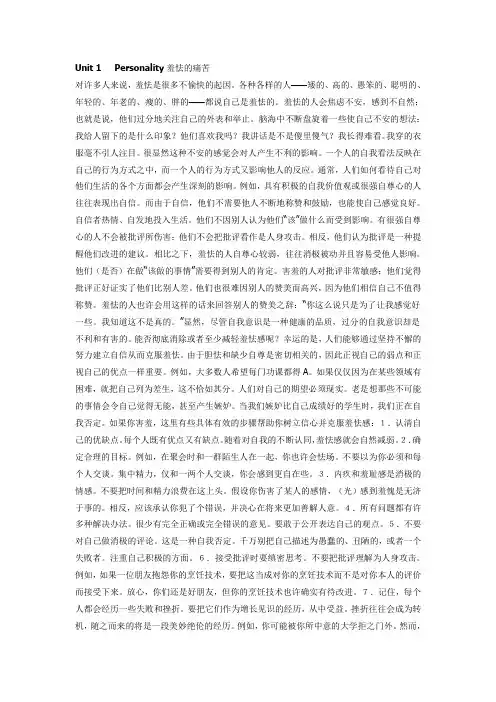
Unit 1 Personality羞怯的痛苦对许多人来说,羞怯是很多不愉快的起因。
各种各样的人——矮的、高的、愚笨的、聪明的、年轻的、年老的、瘦的、胖的——都说自己是羞怯的。
羞怯的人会焦虑不安,感到不自然;也就是说,他们过分地关注自己的外表和举止。
脑海中不断盘旋着一些使自己不安的想法:我给人留下的是什么印象?他们喜欢我吗?我讲话是不是傻里傻气?我长得难看。
我穿的衣服毫不引人注目。
很显然这种不安的感觉会对人产生不利的影响。
一个人的自我看法反映在自己的行为方式之中,而一个人的行为方式又影响他人的反应。
通常,人们如何看待自己对他们生活的各个方面都会产生深刻的影响。
例如,具有积极的自我价值观或很强自尊心的人往往表现出自信。
而由于自信,他们不需要他人不断地称赞和鼓励,也能使自己感觉良好。
自信者热情、自发地投入生活。
他们不因别人认为他们“该”做什么而受到影响。
有很强自尊心的人不会被批评所伤害;他们不会把批评看作是人身攻击。
相反,他们认为批评是一种提醒他们改进的建议。
相比之下,羞怯的人自尊心较弱,往往消极被动并且容易受他人影响。
他们(是否)在做“该做的事情”需要得到别人的肯定。
害羞的人对批评非常敏感;他们觉得批评正好证实了他们比别人差。
他们也很难因别人的赞美而高兴,因为他们相信自己不值得称赞。
羞怯的人也许会用这样的话来回答别人的赞美之辞:“你这么说只是为了让我感觉好一些。
我知道这不是真的。
”显然,尽管自我意识是一种健康的品质,过分的自我意识却是不利和有害的。
能否彻底消除或者至少减轻羞怯感呢?幸运的是,人们能够通过坚持不懈的努力建立自信从而克服羞怯。
由于胆怯和缺少自尊是密切相关的,因此正视自己的弱点和正视自己的优点一样重要。
例如,大多数人希望每门功课都得A。
如果仅仅因为在某些领域有困难,就把自己列为差生,这不恰如其分。
人们对自己的期望必须现实。
老是想那些不可能的事情会令自己觉得无能,甚至产生嫉妒。
当我们嫉妒比自己成绩好的学生时,我们正在自我否定。
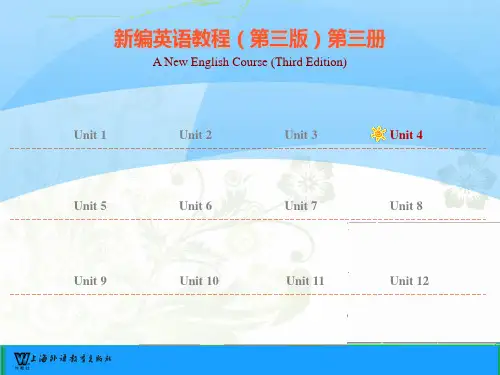
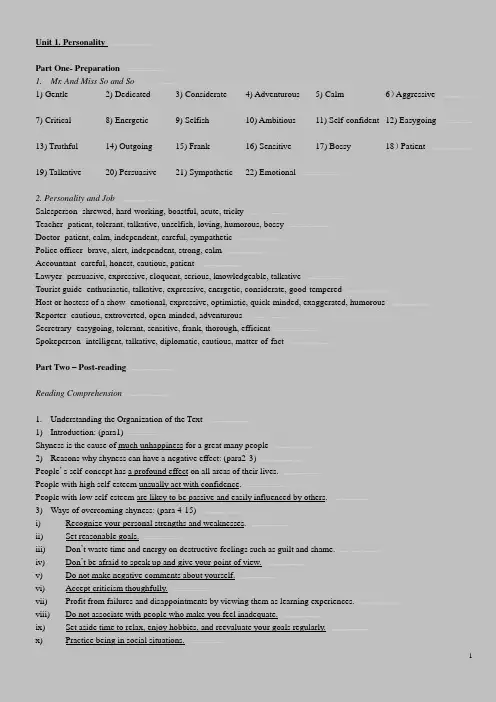
Unit 1. PersonalityPart One- Preparation1.Mr. And Miss So and So1) Gentle 2) Dedicated 3) Considerate 4) Adventurous 5) Calm 6)Aggressive 7) Critical 8) Energetic 9) Selfish 10) Ambitious 11) Self-confident 12) Easygoing 13) Truthful 14) Outgoing 15) Frank 16) Sensitive 17) Bossy 18)Patient 19) Talkative 20) Persuasive 21) Sympathetic 22) Emotional2. Personality and JobSalesperson- shrewed, hard-working, boastful, acute, trickyTeacher- patient, tolerant, talkative, unselfish, loving, humorous, bossyDoctor- patient, calm, independent, careful, sympatheticPolice officer- brave, alert, independent, strong, calmAccountant- careful, honest, cautious, patientLawyer- persuasive, expressive, eloquent, serious, knowledgeable, talkativeTourist guide- enthusiastic, talkative, expressive, energetic, considerate, good-temperedHost or hostess of a show- emotional, expressive, optimistic, quick-minded, exaggerated, humorousReporter- cautious, extroverted, open-minded, adventurousSecretrary- easygoing, tolerant, sensitive, frank, thorough, efficientSpokeperson- intelligent, talkative, diplomatic, cautious, matter-of-factPart Two – Post-readingReading Comprehension1.Understanding the Organization of the Text1)Introduction: (para1)Shyness is the cause of much unhappiness for a great many people2)Reasons why shyness can have a negative effect: (para2-3)People’ s self-concept has a profound effect on all areas of their lives.People with high self-esteem unsually act with confidence.People with low self-esteem are likey to be passive and easily influenced by others.3)Ways of overcoming shyness: (para 4-15)i)Recognize your personal strengths and weaknesses.ii)Set reasonable goals.iii)Don’t waste time and energy on destructive feelings such as guilt and shame.iv)Don’t be afraid to speak up and give your point of view.v)Do not make negative comments about yourself.vi)Accept criticism thoughfully.vii)Profit from failures and disappointments by viewing them as learning experiences.viii)Do not associate with people who make you feel inadequate.ix)Set aside time to relax, enjoy hobbies, and reevaluate your goals regularly.x)Practice being in social situations.4)Conclusion: (para16)The better we understand ourselves, the easier it becomes to live up to our full potential.2. Understanding Specific Information1) F 2) T 3) T 4) T 5) F 6)T 7)F 8)F 9)TVocabulary1.1)self-couscious (worried and embarrassed about what you look like or what other people think of you.)2)self-confidence (belief in one’s own ability, power, judgment, etc,; confidence in oneself)3)self-esteem (the feeling that you are someone who deserves to be liked, respected, or admired)4)self-destructive (with thoughts or actions that are counter to one’s own best interests)5)self-worth (the value you give to your life and achievements)6)self-concept (one’s conception or general idea of one’s own basic character and nature)7)self-awareness (realistic knowledge and judgment about oneself)8)self-assurance/self-confidence (the belief that you are able to deal with people and problems easily)2.1) B 2 ) I 3) L 4) A 5) H 6) D 7) E8) N 9) J 10) M 11) C 12) F 13) G 14) K3.1) profound 2)jealousy 3) numerous 4)overweight 5) overcome6) eventually 7) slim 8) compliments 9) diminish 10) reassurance11) detrimental 12) isolated 13) self-esteem 14) accented4.1) reflected 2) concerned/worried 3) profound effect/influence 4) viewed/regarded5) sensitive 6) respond/ react 7) eliminated 8) overcome my fear9) concentrate on 10) made no commentTranslation1)You should spend a reasonable amount of time relaxing and exercising.(spend time on sth/ in doing sth)2)In general children are healthier and better educated than ever before. (than ever before)3)When the right opportunity comes along, he’ll take it.4)Every day he sets aside some time to be with his family and enjoy life.5)I remember those dark streets and walking hand in hand with my father.6)He finally failed to live up to his parents’ expectations.7)In contrast, our use of oil has increased enormously.8)He succeeded in his efforts to overcome his fatal weakness.Part Three – Further Development1. Enriching Your Word Power1) B 2)B 3)A 4) B 5) D 6) C 7)B 8)C 9)A 10)A 11) C 12) BPart Four- Writing and Translation2.1) It is believed that pessimism often leads to hopelessness, sickness and failure.2) Optimism, by contrast, can make you happy, healthy and successful.3) When you fail in something, profit from the failure as a learning experience.4) Think about your strengths and build up self-confidence in front of problems or difficulties.5) Don’t let negative thoughts hold you back.6)Everyone has experienced failures and disappointments, so don’t blame yourself too much.Unit 2 Myths and LegendsPart One – Preparation4. Matching Pictures1. Aphrodite2. Ares3. Hephaestus4. Artemis5. Demeter6. Dionysus7. Poseidon 8. Athena 9. Apollo 10. hermes 11. Hera 12. ZeusPart Two – Post-reading1. Testing Your Memory1) Because they were invited to a feast in the sky.2) He saw the birds were busy preparing.3) He planned to go to the feast/ sky with the birds.4) They didn’t agree because Tortoise was mischievous/ cunning and ungrateful.5) With a sweet tongue, he convinced the birds that he was a changed man.6) He made two wings with all the features he got from each bird.7) All of You.8) Nuts, meat and fish soup, punded yam, yam soup, palm wine, etc.9) For whom have you prepared this feast?10) Because he knew the answer would be “For all of you”, which was his new name. So he could enjoy all the food first.11) They were very angry.12) They took back the feathers they had lent him.13) He asked him to take a message to his wife.14) Parrot, because he wanted to take advantage of the chance to get revenge.15) He asked Parrot to tell his wife to bring out all the soft things in his house and cover the ground with them so that he would be able to land safely. But Parrot told his wife to bring out all the hard and sharp things instead.16) His shell was broken into hundreds of pieces.Vocabulary1.1) A. invitation B. invited C. inviting2) A. prepare B. prepared C. preparation D. preparatory / preparation3) A. discoveries B. discoverers C. discovered4) A. approval B. approve C. approved D. approvign E. disapprove5) A. eloquent B. eloquence C. eloquently6) A. faithful B. unfaithful/ faithless C. faith D. faithfully7) A. occasional B. occasionally C. occasion8) A. delivery B. delivering C. delivered9) A. troubesome B. troulbed C. troubled D. troubling10) A. assurance B. assured C. assure2.1) got/ran into trouble 2) no trouble 3) asking for trouble 4) have…trouble5) trouble with 6) in serious/ deep/ big trouble 7) get/getting …into trouble 8) took the trouble3.1) with a pattern of roses.2) prepared a wonderful / good meal for us3) promised faithfully4) deliver this letter5) a selection of milk and plain chocolate6) keep out of mischief / behave themselves7)the sound of distant thunder8) received approval from the government9) in spite of the fact that he drank too much10)agree whether the drug is safe or notPart Three – Further Development1.Enriching Your Word Power1) C 2) C 3) A 4) B 5)A 6) B 7) A 8) B 9) B 10) A 11) B 12) APart Four – Writing and Translation2.Translation Practice万物之初,天体还是一体,充满混沌。
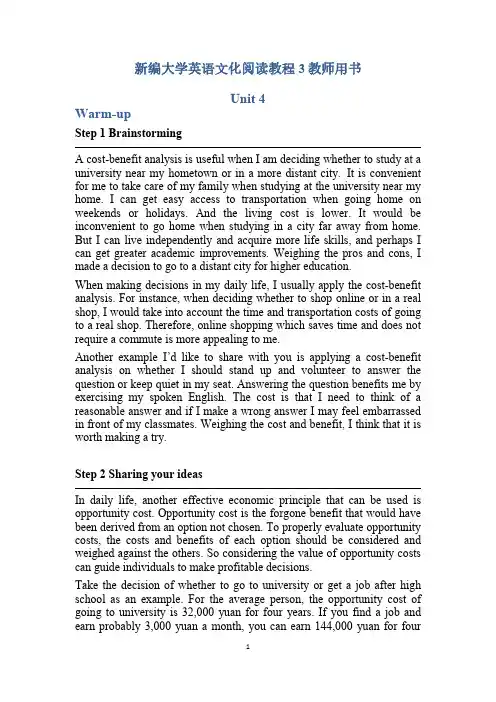
新编大学英语文化阅读教程3教师用书Unit4Warm-upStep1BrainstormingA cost-benefit analysis is useful when I am deciding whether to study at a university near my hometown or in a more distant city.It is convenient for me to take care of my family when studying at the university near my home.I can get easy access to transportation when going home on weekends or holidays.And the living cost is lower.It would be inconvenient to go home when studying in a city far away from home. But I can live independently and acquire more life skills,and perhaps I can get greater academic improvements.Weighing the pros and cons,I made a decision to go to a distant city for higher education.When making decisions in my daily life,I usually apply the cost-benefit analysis.For instance,when deciding whether to shop online or in a real shop,I would take into account the time and transportation costs of going to a real shop.Therefore,online shopping which saves time and does not require a commute is more appealing to me.Another example I’d like to share with you is applying a cost-benefit analysis on whether I should stand up and volunteer to answer the question or keep quiet in my seat.Answering the question benefits me by exercising my spoken English.The cost is that I need to think of a reasonable answer and if I make a wrong answer I may feel embarrassed in front of my classmates.Weighing the cost and benefit,I think that it is worth making a try.Step2Sharing your ideasIn daily life,another effective economic principle that can be used is opportunity cost.Opportunity cost is the forgone benefit that would have been derived from an option not chosen.To properly evaluate opportunity costs,the costs and benefits of each option should be considered and weighed against the others.So considering the value of opportunity costs can guide individuals to make profitable decisions.Take the decision of whether to go to university or get a job after high school as an example.For the average person,the opportunity cost of going to university is32,000yuan for four years.If you find a job and earn probably3,000yuan a month,you can earn144,000yuan for fouryears.It seems like that based on the above scenario,taking a job has a financial advantage over going to university.Does that mean we shouldn’t go to university?The answer is No.Not everyone has the ability to obtain a considerable-paying job out of high school.But,people who graduate from universities typically have long-term career salaries than those without a bachelor’s degree.In the long run,the four years spent pursuing a degree in universities benefit one’s career life more and would result in a higher financial benefit.Reading1Language focus1.optimal2.bulk3.demographic4.stagnant5.prodded6.transaction7.transmit8.enormousGlobal understanding1)starker2)mores3)saving habits4)economic context5)economic transactions6)Trust levels7)financial contracts8)willingnessDetailed understanding1.T2.F3.F4.F5.T6.T7.F8.TCultural thinkingA penny saved is a penny earned.People’s attitudes towards saving or spending differ.Why do some people save more than others,even if they have similar incomes?The traditional answer has been that there are idiosyncratic differences between individuals—some of us are frugal, and some are not—while countries differ on things like demographics, credit availability,income expectations,and uncertainty.All the explanations are true.But it might not be the whole truth.It’s also possible that our savings behavior is shaped by the cultural impact of which we were brought up with.Most Asian countries,such as China,Singapore,and South Korea have traditionally had high savings rates.All these countries are influenced by the virtue of frugality.Another example is that Americans who were descended from slaves save significantly less than other Americans,even if they have the same incomes.This shows the legacy of slavery is still with us:slaves could not own property and so never had a savings culture. This absence of saving has been transmitted down the generations.Reading2Language focus1.incentive2.restrictions3.inhibit4.convincingly5.susceptible6.incomparably7.abuse8.perceptionGlobal understanding1)biased2)life experience3)acculturation4)implementation5)inequality6)interventions7)alternative narrativesDetailed understanding1.F2.F3.T4.F5.T6.TCultural thinkingVersion1:Yes,I agree with the author.Changes in people’s mindset can affect the economy.For example,in China,there is a traditional economic concept of“living within one’s means”,so traditionally people would spend money according to their savings.But with the development of society,modern young people have started to accept the idea of “spending in advance”and are consuming with credit cards.This is a huge change in mindset and has had a correspondingly impact on the development of China’s financial markets.Version2:No,I don’t agree with the author.Economic development and changes in mindset are not tightly linked.With the modernization of society,the economy in China is constantly and steadily developing and progressing.However,people living in distant rural areas can't keep up with the pace of social development.In this regard,the poverty alleviation measures of the central and local governments can help them transform their production and lifestyle,thus changing the local economic situation and achieving the result of poverty alleviation and common prosperity.Integrated thinkingAnswer1:I think my economic behavior is quite similar to my classmates. We are all financially dependent on our parents.In order to live within our means,we all like shopping online.Through shopping online,we can search for bargains and save both money and time.And we rely very much on user reviews and recommendations when shopping.Some social apps enable influencers to advertise the products.We,as young Chineseconsumers,also like spending money on dining in fancy restaurants, having entertainment,and doing sports,which I think is Gen Z’s consuming fashion.Answer2:Chinese parents always say“Don’t spend all of your money. Save it for a rainy day.”When making financial decisions,the Chinese prefer to“save”rather than“spend”.However,the economic behavior of young Chinese has changed and is not that different from young people in other countries.Answer3:Traditional Chinese culture plays a profoundly important role in young people.Most Chinese young people are still very rational in their spending and do not spend money blindly on luxuries that they cannot afford.They are more likely to spend wisely when making purchase decisions.Culture mosaic1How different cultures deal with cashVersion1:Yes,I have a habit of saving.Saving money is important because it gives me more financial security,stability,and freedom. Having savings also protects me during financial emergencies to avoid debt and reduces stress.Additionally,saving money also enables me to help others and support my family to some extent.Every month,I will budget my living expenses given by my parents rationally and wisely.Apart from essential living expenses,such as eating and accommodation,clothing,and daily necessities,I will save up the rest money.Every year at the Chinese New Year,I receive red packets from my elders.I will put the money in the bank,mostly with low-risk capital preservation projects to avoid financial risks.The saving habit allows me to rely on myself when I need to spend a large amount of money,such as on graduation travel.Version2:No,I don’t have a habit of saving.The top reason is that I believe in the philosophy of“living for today”.I don’t know what tomorrow will offer.Therefore,I want to live each day to the fullest.I like to try new things and enjoy new experiences.I spend my money on hobbies,such as camping and rock climbing,which are very exciting but also costly.The other reason is that I have no financial income.My parents provide me with monthly living expenses,so I have to live within my means and don't have much money to save.Although I may find a part-time job to earn money after school,I choose not to do so since I am spending my time mainly on the study.After all,studying is moreimportant to me now.I plan to save and invest wisely after I graduate from university and find a job.Then I can be financially independent, wisely budget my income,and achieve financial sustainable development.2From anathema to acceptability:the story of life insuranceI think life insurance is very important for me and my family.As there are always unexpected accidents,fatal injuries,and diseases in our lives.Death,disability,illness,and other hazards in our lives are all called personal hazards.Therefore,life insurance,as a method to deal with personal hazards,is important.It helps to provide financial help to the insured person.It is traditionally taboo to mention illness or death in Chinese culture.But in modern social life,these risks inevitably exist.Over the years,my attitude towards life insurance has changed.Now,I am willing to buy life insurance for myself and my family.In this way,I can at least protect my property in case of accident or danger.3Money factsI’d like to share with you a new form of currency,call e-CNY.The e-CNY,or digital yuan,is a centralized,cash-like digital currency that is expected to be primarily used for retail payments in China.The e-CNY has been applied in over a million cases,covering utility payments, catering,transportation,shopping,and government services.It can be understood as the third largest electronic payment tool after WeChat Pay and Alipay.The most important purpose of the central bank’s introduction of e-CNY is to protect the sovereignty of the currency,as well as to enhance the RMB's position in the international market.It is aimed at creating a financial infrastructure that serves billions of people around the world, such as solving the challenge of sending money internationally to people all over the world in a convenient and efficient way.。

Unit 4 Career Planning择业规划1 进行择业规划不一定要遵照常规的或合乎逻辑的步骤。
我们每个人对不同的因素有不同侧重,也许在不同的时候会考虑择业规划的不同方面。
进行择业规划,要收集有关我们自身以及职业的信息资料,估计采取各种举动可能出现的结果,最后做出我们认为有吸引力并且可行的选择。
2 许多观察家指出学生在择业规划方面不是很在行。
他们列出了以下事实:1)大部分学生选择职业的范围很窄;2)多达40%至60%的学生选择专业性的职业,而实际上只有15%至18%的从业人员在做专业性的工作;3)男青年对文书、销售以及服务性行业兴趣索然,尽管这些领域会提供许多就业机会;4)多达三分之一的学生说不出选择什么职业好。
3 欧文·贾尼斯和利昂·曼在他们的《决策》一书中指出,许多人的决策方式存在严重缺陷,而这些问题似乎与人们处理问题的模式有关。
第一个缺陷是自满。
有些人对于要费心思考虑的择业信息置之不理,这就是自满的表现。
有些人采取“这不会影响我”或“这永远也不会发生”的态度,这就是以自满作为支配地位的行为模式。
当然,对于那些不决定成败的决策,自满是可以的,但在做职业方面的决策时,来不得自满。
4 人们在决策方式上存在的第二个缺陷是消极回避。
每当面临抉择而又自认为找不到合适的解决方法时,一些人或想入非非或做白日梦,以此来保持平静。
有些学生没有考虑到职业抉择会产生的影响,往往采取文过饰非(对自己的行为所作的解释虽能自我满足但却是错误的,以此来欺骗自己)或者拖延(推迟或耽搁)的态度。
面对现状也许会令人焦急不安,但认真考虑一下各种方案也能给人宽慰。
5 第三个缺陷是过份地提心吊胆。
当人们面对职业选择而又感到没有足够时间找到解决方法时,会感到惊慌失措。
他们紧张地寻找各种就业机会,然后采取匆忙的决定,忽视了这样的选择会带来的后果,也忽视了其他的择业机会。
惊慌失措的人往往会思路不清,缺乏逻辑。
6 最好的做法就是眼观六路,耳听八方。
Unit 4●Useful Expressions①遵照常规的或合乎逻辑的步骤follow routine or logical steps②专业性的职业professional occupations③15%的从业人员15 percent of the work force④男青年对文书、销售以及服务性行业兴趣索然。
Young men show a striking lack of interest in clerical, sales, and service occupations.⑤最好的做法就是眼观六路,耳听八方。
The best coping behavior is vigilance.⑥你应该审视自己的长处与弱点。
You should examine your strengths and weaknesses.⑦把对自己事业发展的设想归纳起来。
Organize ideas about your career development.⑧模糊、不成熟的想法unclear and half-formed ideasUnit 5●Useful Expressions●我呆呆地站在我家的门廊上,内心充满了期盼。
I stood on the porch, dumb, expectant.●我隐约猜到将有不同寻常的事发生。
I guessed vaguely that something unusual was about to happen.●我的未来究竟会出现什么样的奇迹,我茫然无知。
I did not know what the future held of marvel or surprise for me.●就在那个时刻,爱的光芒洒在了我的身上。
The light of love shone on me in that very hour.●这些是我在后来才知道的。
I did not know this until afterward.●在强烈的情感发泄之后,我既伤感又懊悔。
[重点]新编大学英语3视听说教程听力原文U4 Listen 1For many of you this will be your last year at university and now is the time for you to begin thinking seriously about your future careers. In order to give you as much help as possible, I have quoted a list of questions that you ought to ask yourself.First, "Have I got a clear knowledge of my abilities as well as my interests?" Be honest about your weaknesses as well as your strengths. Take a really good look at yourself and give real thought to the kind of person you are, and what kind of person you want to be.Second, "Do I know the kinds of occupations in which people like myself tend to find success and satisfaction?" Talk to people who have similar abilities and interests and who are already in the careers that interest you. You can gain some idea of what they consider to be important and challenging in those careers. Watch these people at work.Third, "Have I weighed carefully the immediate advantages againstthe long-term prospects offered by the jobs I am considering?" Will the occupation you select give you satisfaction in the years to come? Realize now the importance of education in all fields, technical and professional. Remember that chances of promotion are usually given to educated persons—other things being equal.Fourth, "Have I talked with my parents, my teachers and my headmaster?" Remember they have a lot of experience that you can benefitfrom. They can help you think about the jobs. They can stimulate you to give careful thought to what you really want to do, and offer useful suggestions about how you might take full advantage of your personal qualities and qualifications.Last, "How do I regard my job? Is it just a means of getting money to do the things that I want to do? Is the work important to my future happiness? Is it a combination of both?"The above questions and their answers should give you some better ideas about how you should start planning your career. Your life-long job cannot be approached in any kind of haphazard fashion. It must be considered carefully, examined from every angle, and talked over with those who know you and those who can help you in any way.Listen 2I: Some people feel that their jobs are misunderstood by others. Is that very common?S: Oh, absolutely. Most jobs or professions have an image or stereotype attached to them, and some of these are not realistic. The serious point is that young people choose their careers based on these false images, and they may even avoid certain careers which have a negative image. This can cause problems for the economy.I: Is there evidence of this problem?S: Yes, there was a recent survey of children's attitudes to different professions.I: How was this done? Children don't know much about jobs and professions.S: True. What the investigators wanted to get was children's impressions and prejudices. They gave the children twelve pairs of statements, one of the pair positive, and the other negative. Children were asked to say which of the statements was "most true" for each profession.I: For example?S: Well, for example, "Such and such a person is likely to be boring or interesting company."I: I see. What professions did they ask about?S: The list is long, but it included lawyers, economists, accountants, sales representatives, scientists and engineers.I: And the results?S: Well, they are striking, especially for engineers who came out much worse than one might expect. About 90 percent of the children thought that engineering was a "dirty job", of "low status", and the engineer was more likely to take orders than to give them. The only other person they thought more likely to lose his job was the sales representative. But, there were good points too. Engineering was seen to be "interesting, well-paid work".I: Hmm, not a rosy picture.S: No, but it got better when children were asked what they thought of the engineer as a person. Most of them chose positive comments, but most thought the engineer was likely to be badly dressed.I: What about other professions? What were the most popular?S: Oh, the lawyers by far. Next came accountants and scientists as well as economists. The engineers and sales representatives were the least popular.I: Sounds like a sign of the times.S: Yes, but I think the most serious implication was the children's apparent ignorance of the importance of the engineer's role in society.Practice 1W: Look. Here's a job that might interest you.M: What is it? Are you sure? The last job interview you sent me off to was a disaster.W: Well, look. It says they want a sales manager, and it looks like it's a big international company. That'dbe good. You might get to travel.M: What kind of company is it, though?W: Um, let's see. Yes, it's a textile company that seems to import from abroad. They say the salary is reallygood. They operate a system of paying you a basic salary and then offering you a sales commission ontop of that. They say it is high. And oh, look! They give you a car to travel round in. That's not bad, isit?M: Um, do they say anything about experience?W: Um, let's see. No, they want someone young with ambition and enthusiasm. Oh yes, they wantgraduates, so that's OK. You've been to university. Now what else? Let's see.M: There must be some catch.W: No, the only thing is you have to travel, but then that's what the company car's for. Oh, and you have to beable to get on well with other people because it says you have to be good on a team.M: Um, perhaps I'll have a closer look at that one.Practice 2W: Now what do you want to see me about, Janet?J: Well, I have a few questions I'd like to ask you, Mr. Womack. Can you give me some information about secretarial jobs?W: Yes, of course. First, let me get your file out. Now you're 16, aren't you?J: That's right.W: Well, what would you like to know?J: About the opportunities in general and the basic training, and things like typing speed and shorthand speed.W: Before we go any further, Janet, when you said secretarial work, did you only mean typing or moregeneral things?J: Well, I suppose I'd have to start as a word processor operator, wouldn't I?W: If you left school at sixteen, yes. But if you wanted to have a better chance of getting a more interestingsecretarial job more quickly, it would be better if you stayed on and took A levels. According to yourfile, your English is good, and you've done French and economics, haven't you?J: Yes, they're my best subjects. If I stayed, what A levels would I need to be a secretary?W: That depends, but those three subjects are all very suitable.J: And then I suppose I'd have to do a secretarial course, wouldn't I? Um, what sort of speed do they expect?W: I've got the typing speed here, I think. Oh, yes, it should be 65 words per minute.J: And would I have to learn shorthand?W: Yes, you would. You'd need a speed of 90 to 100 words a minute.J: Oh, it sounds a lot, doesn't it? Would I have a chance to use my French?W: Oh, yes, if you were a secretary with languages.J: What sort of work would I have to do?W: Well, you'd have to translate letters, of course, but you'd also have to answer the phone to foreigncallers and interpret if foreign visitors came to the firm. It would be useful if you learned a secondforeign language. That would help a lot.J: I think I'd like a job like that. But I'd better go away andthink about it. You see, well, after all, two more years at school is a long time, isn't it?W: I'm sure it seems so at your age. If you need any more help, please come back and we'll talk about itagain.J: Thanks, Mr. Womack.Practice 3D: Hi! You're listening to Radio Southwest, the best in the southwest for music and up-to-the-minute news.Sue's here. Hello, Sue.S: Hello, David.D: And we've got the Jobspot for you today. So, if you're lookingfor a new job, this could be the spot foryou. So, let's have a look, and see what we've got today.S: Well, the first one we've got is a cook. That's in a large, busy restaurant, so it's very useful to have hadexperience in cooking. Must be a high school graduate and the pay is $12 an hour. So that's not bad, isit? The hours are good too. That's Monday to Friday, 3:00 p.m. till 6:00 p.m.D: Great. Thanks, Sue. So that's a cook. Now, how do you fancyworking out of doors? How do you fancybeing a gardener? So as long as you're fit and strong, and at least16 years old, that'll suit you. The payis $8 an hour. And the hours, Tuesday to Saturday, 8:30 a.m. to 5:00 p.m., you have to work on Sundayonce a month, but on Monday the Garden Center's closed. Now, thesort of work you'd be doing ispotting, watering, things like that. So, how about applying for that? Pay, $8 an hour. Sue, what elsehave you got?S: Right, Dave. Well, from outdoors to indoors. We've got a word processor operator job here. This job might suit a woman with school-age children, because the hours are only 15 hours a week. It's a small, friendly office, and they require a high school graduate with two years' experience operating a computer. Pay is $9 per hour. So, there you go. That's a nice job in an office. If you fancy any of those jobs, give us a ring here on Jobspot at Radio Southwest. And now back to the music.Practice 4A: Do you think anybody can be trained to be a teacher?B: Well, I think there are probably some people that can be teachers but I think it's a gift that you have.And not many people have that internal kind of thing.A: Can you define any of that?B: Oh...A: What sort of specific uh...are there certain personality...B: Well, I think that the best teachers are people that are fairly sensitive, and, er, extroverted, okay? A: Uh-huh...B: The best teachers I know are kind of extroverted people, and they really like kids... A: Uh-huh.B: But, by the same token, I know some teachers who really careabout doing a good job and want thosekids to like them and want to do well.A: Right...B: But for some teachers, they just don't have it. And it's...it'ssad when you see that happening, becausethere're some teachers who don't care, you know—they're just in it now because they've been in it solong and it's too late to move out...and...A: Well, aren't there some very definable management skills involved in teaching that often are neglectedin teacher training, maybe? I mean...B: I don't know how you train somebody to do that. To be a good teacher, I think you have to have a hightolerance level for confusion—I think you have...A: Um...B: To have that when you've got thirty kids... You have to have that. You have to be a very patient person,and I know it just sounds totally inadequate, but I don't know howto put my...my finger on it. It just...A: But you do believe it is uh...there is a gift of some sort, or there is something...B: Yeah, I do.Text 1There are at least 100 million workers in the Unites States. Most of them are on the job 35 to 40 hours a week. Their typical day includes seven to eight hours of work. Usually, they have a 15-minute coffeebreak in the morning and in the afternoon. But work schedules vary from job to job.White-collar workers—office workers and many professionals—usually have "nine to five" jobs. Theybegin at 9:00 a.m. and finish at 5:00 p.m. Monday through Friday.Blue-collar workers—mechanics,electricians, and laborers—often work from 8:00 a.m. to 4:00 p.m.In many factories, blue-collar workers come to work in eight-hour shifts. Typically, these shifts start at 8:00 a.m., 4:00 p.m., and midnight. Finally, sales people and managers in retail stores work on Monday and Thursday nights, when the stores are open. Many retail workers also work on Saturdays, and some work on Sundays.These are the normal schedules for most American workers. However, many businesses now use a new system called "flex-time scheduling". Under this system, the employees choose their own working hours. Somepeople work from 8:00 to 4:00 five days a week. Some work from 9:00 to 5:00. Other people work 10 or 12 hours a day four days a week. Employees and managers are both happy with the system. The employees like the freedom of choice, so they work hard. The managers, of course, like the hard-working employees.What, then, is a typical work schedule? It depends on the job—andon the workers.Text 2M: How long have you worked for AM-ADMEL, Gill?W: Only for a year. It's May now, isn't it? Yes, I joined last August in fact.M: August in 1996.W: Yes.M: What did you do before that?W: I used to work for a travel agency in London.M: It was interesting, wasn't it?W: Not really. It was just secretarial work, rather like this job. And it wasn't too well-paid. But I took asecretarial course when I left school and I couldn't think what else to do.M: So you went straight from school into a secretarial course,didn't you?W: Well, not quite. I left school when I was 16, in 1989, I think it was. And then I went to work in a hotelin Austria for a year, to learn some German.M: Austria? Why Austria?W : I don't know really. Well, we used to go there on holiday quite often when we were younger, and, well, I like Austria actually. Anyway then I went back and did the secretarial course. That was a year's course.M: And then you got the job at the travel agency I suppose.W: Yeah, that's right. That was in 1991.M: So you were there for five years!W: Yes, it's awful, isn't it? Actually, I'm thinking of giving itall up to become a nurse.M: Really?W: Well, I worked in a hospital in Twickenham during my last year at school. Just cleaning and helping tomake beds and so on. It was part of our Practical Careers training.M: And you liked it?W: Yes, it was interesting.Text 3M: Well, now then, one thing I'd like to ask is, er, exactly why you applied for the job. I mean, just lookingat your application form, you're actually over-qualified...W: Yes, I thought you might ask that. Um, the thing is, in my present job, although I'm actually in chargeof a small team and I have a lot of responsibility, it's largely a desk job with a lot of paperwork...M: And you're not too keen on being stuck in an office all day?W: To be honest, no, I'm not. I much prefer being out on site where I can supervise things, and deal withproblems as they occur. And this job should give me the kind of contact with other engineers, architects,builders and so on.M: Mmm. You'd certainly have to do quite a lot of traveling in the local area, you know, visiting differentsites. You do realize, though, that the starting salary isn't as good as the salary in your present job? W: Yes, I realize that, but um, it does say in the job advertisement that the promotion prospects are very good.M: That's true, and er, as this is a new project that we're working on, we think there'll be a very goodchance of fairly quick promotion, depending on performance, that is...W: Yes, of course. Well, you see, I've got very little chance of promotion in my present job. I mean it's a very small company andthere's nowhere really for me to go; that's why I'm looking around for somewhere else.。